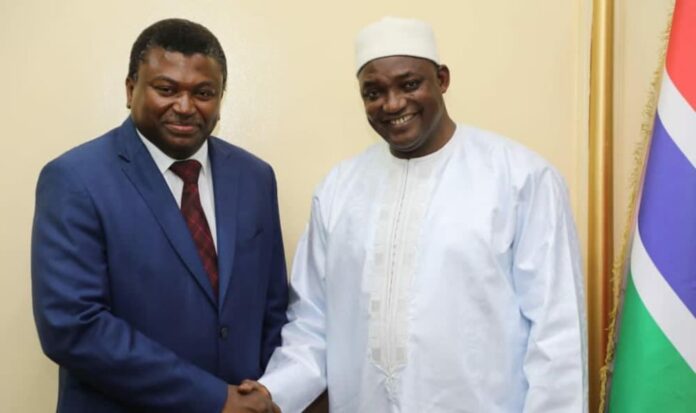Comment
By: Cherno Baba Jallow
Going into the 2021 presidential elections, two pertinent questions followed incumbent Adama Barrow on the campaign trail: How competent was he? How much did he grow on the job? Barrow might not have grasped the sheer immensity of the doubts swirling around his ability to govern.
Or perhaps he did, just that it didn’t bother him because he sensed the disconnect between what voters thought of him and what they would actually decide on Election Day. Distilled to its essence, the 2021 presidential election turned out to be a farce. Ideas? Voters were drawn to other things. Consider the alternatives? They demurred. It was never about who was better equipped with the know-how of statecraft.
Margaret Thatcher once said, “First you win the argument, then you win the election.” If Barrow had won the argument in 2021 and thus the election, it was largely in the realm of sentiments rather than in ideas: The general perception went something like this: Barrow was more likable than his main challenger and former vice president Ousainou Darboe. Voters felt more at ease with him than with his rival. So, he coasted to victory, not by dint of his own electoral finesse or by a consensus affirmation on his stewardship, but by what the overwhelming members of the electorate saw in or feared about, his main rival.
It was to Barrow’s benefit, gifted by an opposition unable to make it a referendum on incumbency, that the 2021 election campaign largely avoided talking about issues pursuant to presidential ability. It was a squandered opportunity to litigate and to deal a decisive electoral blow to the blundering ineptitude of Gambian leadership since the last election cycle.
For the sake of representative governance, and to help avoid incumbents think infallibly of themselves, perhaps it is best when the re-elections are keenly contested, when incumbents do not have it so easy, when they come out of re-election campaigns victorious but bruised, chastened by the fact they almost lost or barely won.
Perhaps, if Barrow had been humbled by a near-defeat, he would have been forced to take the job of the presidency more conscientiously. He would have finally come to grips with his leadership shortcomings and worked even harder towards improving them. But six years later, he is still struggling, perhaps unwilling, to vitalize his presidency. Get this: management of national affairs is not his forte. The evidence is conclusive, if tardy.
His speech to the nation on the deaths of the 66 kids after it was found out some cough syrup imported from India had killed them, was a new low in how not to level up with your constituents during a national crisis. Instead of becoming the mourner-in-chief, speaking directly from his heart and reassuringly to a country in shock, Barrow sounded impersonal; his body language was antithetical to the sombre mood of the nation.
These deaths are a national tragedy of cosmic proportions. No country should allow the nefarious practices of poorly regulated multinational pharmaceuticals to work in cahoots with greedy local citizens to wreak havoc on its national health sector. If the health minister Dr. Amadou Samateh won’t resign for this tragedy, then Barrow should demand it from him. Or worse.
It’s leadership malpractice to bring on board people who don’t have the requisite competencies attendant to the task at hand. Worse still, coddle them after they have failed to perform their duties or have caused damage to the public interest.
But Barrow is reluctant, scared even, to fire his employees. It took him a good while to summon the courage to fire Darboe, who, catapulted by the cult of personality and armored by the wages of political hubris, had thought he was too powerful to be given the sack. He was mistaken.
After the sacking of Darboe, which was actually largely driven by individual rather than national, interests, Barrow is yet to repeat a similar feat of boldness. He has gotten increasingly cold while impropriety and waywardness go ascendant in his government.
In this season of discontent, triggered by heightened worries over the rapid decline in economic livelihood and the frequency of murders in the streets, deep-seated anger at the miscarriage of justice in the Bob Keita case and at per diem-chasing government officials, it’s a national imperative that Barrow show attentive leadership. He should be more attuned to the everyday concerns and challenges of the people and be more informed about the running of the bureaucracy and the undercurrents in society. Out there, exists a pervasive sense of hopelessness about the current state of the nation. Its future, too.
But is Barrow paying close attention to the pulse of the nation? Recently, he said that the $20 airport tax will help contribute to national development, but the tax is unpopular. It is also affecting the tourism industry. In 2018, he dismissed the outrage over the costs of a private jet he used for his trip to the United Nations General Assembly meeting in New York City. “It is just 4 Million Dollars…. compared to other countries,’’ he told journalists.
During the 2016 presidential elections, Barrow was the lead, albeit unknown, campaigner for democratic change in The Gambia. Perhaps, he and the majority of the voters who went for him had in mind H. L. Mencken’s famous saying: “Democracy is the belief that people know what they want and deserve to get it good and hard.’’ Gambians knew what they wanted and went hard for it: the end of the tyranny of one man and the intimidating control of society.
But now, there is something else Gambian voters want, but must start working hard for it: productive governance. The current occupant of the seat of power is still struggling to provide it.









